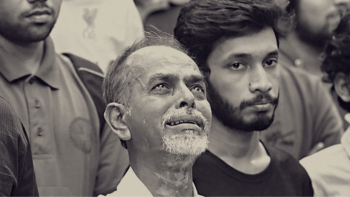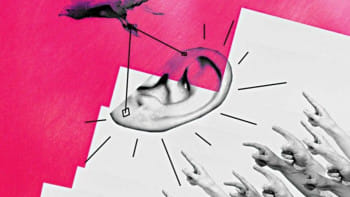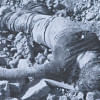Coping with the mystery of Fardin's death

Do we need lies to live? Probably yes, if we think of life as nothing more than a series of denials, i.e. a defence mechanism that helps us cope with one core truth: the inevitability of death. You must be thinking: what a morbid way to reflect on the morning after Victory Day. I am reeling from a heartfelt talk given by my freedom fighter colleague, poet-professor Dr Kaiser Haq.
At a programme observing the Martyred Intellectuals Day organised by Dhaka University's English department, Haq, who was a second-year student in 1971, recalled meeting his professor, Khan Sarwar Murshid, in Kolkata before being transported to Agartala for training. Prof Murshid told him that he had gone to see his departmental colleague Jyotirmoy Guhathakurta, who was shot during the carnage of March 25. The bullet-ridden professor, on his death bed at Dhaka Medical College Hospital, extended his beatific smile seeing his colleague and asked, "How are you doing?"
The anecdote made me think: was it mere courtesy? Or was it an uncanny correspondence between the dying and the living? The single question epitomises the sentiment of the three million people who made their ultimate sacrifice: how are we?
The Pakistan Army targeted the intellectuals knowing that they were capable of exciting resistance. What they could not do during the nine-month-long war was completed by their local collaborators. The brutal and systematic murder of the intellectuals on December 14, 1971, just two days before the nation's victory, makes our independence a strange mix of happiness and sorrow. The legacy of blood symbolised in our flag contains mixed feelings more than anything.
When the body of Fardin Noor Parash was found floating in the Shitalakkhya, by a cotton mill in Shiddhirganj, it appeared like a statement. It took the river three days to return his body, and more than six weeks for the investigating officers to proffer an explanation of his death.
Soon after the news of a Buet student's disappearance was reported, the internet became vibrant with conspiracy theories. The casual and callous remarks of forensic doctors and the different probe agencies did not help the cause either. The doctor responsible for the autopsy, referring to the injury marks on Fardin's head and different parts of his body, gave his verdict, "Fardin died three days ago and was physically tortured before his death."
Police tracked the mobile phone signals of the deceased to find his SIM card active near the slum at Chonpara in Narayanganj, which is a notorious haven for drug dealers and abusers. This led the police to come up with the theory that Fardin had gotten involved in an altercation with drug peddlers who might have mistaken him for a police spy, and he must have been killed and dumped in the nearby river.

Meanwhile, Fardin's friend, with whom he was last seen spending the day, was picked up as a possible suspect and placed on remand. The victim's father even filed a case against her and an unnamed accomplice.
Fardin and his friend knew each other for four years as they were both involved in debating. Fardin was preparing himself for an international debate competition in Spain. He needed about Tk 60,000 for the tour. For someone whose income from doing tutoring supplemented not only his own educational expense, but also those of his two younger brothers, managing this additional funding proved to be a source of anxiety. The text messages found in Fardin's phone demonstrate his financial worries, which allegedly affected his recent academic performance. According to police, new CCTV footage shows that Fardin jumped off a bridge.
The spokesperson of Rapid Action Battalion (Rab) met a group of protesting students from Bangladesh University of Engineering and Technology (Buet), journalists and family members to show the footage of Fardin's final moments. His friends are not fully convinced as the police are yet to confirm if he had reached the spot on his own or was compelled to do so. His father finds it difficult to deal with the possibility that his dutiful and responsible son could thus end his life. In an emotional plea, he rejected police's claim, saying that they were digging four more graves for him and three other members of his family.
Fardin's father's denial is conditioned by the mixed signals given by police, doctors, and journalists earlier. The suspicious killing of a drug lord soon after the incident added to the mystery.
For Fardin's friends and family, it will be hard to believe that he ended his life with the deepest need to be free of all anxiety. The irony is, life awakens anxieties in us. To come to terms with these issues, we need to address their sources.
First, we need to create an anxiety-free environment for our students. Buet, for instance, has a strong alumni network that must come to the aid of students in need of financial and psycho-social support. A small bursary for the debate competition could have taken the pressure off Fardin. It will not bring Fardin back to life, but it will surely make things easier for any potential victims.
Second, our national institutions should be more responsible before making public statements as well. Earlier, we saw a similar report of an autopsy claiming death by injury of a former Chhatra League leader of Jahangirnagar University. Later, video footage showed a boat (which was carrying the victim) that capsized after being hit by a vessel. He had drowned. His family is still in denial. The initial claims will remain a constant source of trauma for his kin. The same is true for Fardin. His death, conditioned by misery, will keep sending us on guilt trips. His beautiful smile will keep on appearing in the newspapers to ask: how are we doing?
We can do justice to Fardin's memory, and by extension to that of all intellectuals, by creating a system that makes sense.
Dr Shamsad Mortuza is a professor of English at Dhaka University.

 For all latest news, follow The Daily Star's Google News channel.
For all latest news, follow The Daily Star's Google News channel. 










Comments